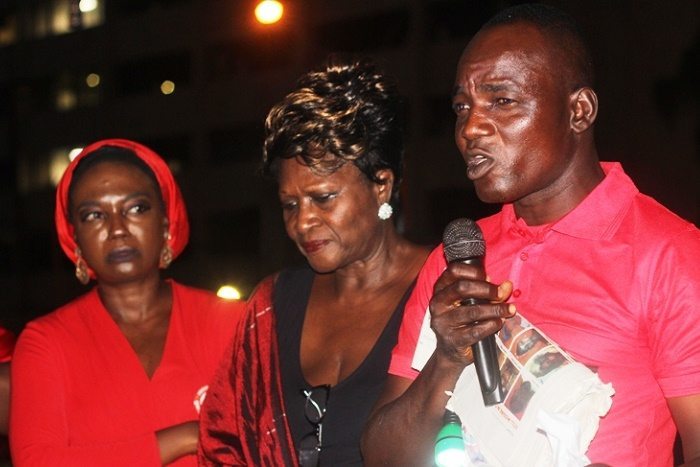Activists Demand More Action One Year After Nigeria School Kidnappings
Nigerian activists and citizens are demanding more action as the country marks the one-year anniversary of the abduction of more than 200 teenage school girls.

Nigerian activists and citizens are demanding more action as the country marks the one-year anniversary of the abduction of more than 200 teenage school girls.
Boko Haram kidnapped about 276 girls from their school dormitory in the northeastern town of Chibok on the night of April 14, 2014. Fifty-seven girls escaped, but others remain missing.
Since then, Nigerians have criticized the government’s response to the situation, urging officials to rescue the girls. The hashtag campaign #BringBackOurGirls gained global attention and eventually became the name for their nationwide movement.
But activists are now looking beyond social media for action.
“We are pleased with the support worldwide but we need to move beyond hashtag activism,” said Aisha Oyebode, coordinator of the Bring Back Our Girls movement in Lagos, in a statement. “We expect both the international community and our government to rise up to the expectation that they have a responsibility to protect our children from what one can only define as a mass atrocity crime and gross human rights violations.”
Oyebode was among hundreds of Nigerians who gathered and held a vigil in Lagos on Tuesday to mark the anniversary of the abduction of the school girls. At the vigil, activists reiterated their resolve to maintain pressure on the government to rescue the kidnapped girls.
“I cannot imagine what it must be like every night [to] not know what’s happening to your child. … Posterity will judge us if under our watch 200-plus Nigerian girls go missing and we don’t do anything,” Oyebode told Rewire.
On the day of the anniversary of the abduction of the Chibok school girls, Amnesty International released a report saying at least 2,000 women and girls have been abducted by Boko Haram since the start of 2014, with many forced into sexual slavery and trained to fight.
“The evidence presented in this shocking report, one year after the horrific abduction of the Chibok girls, underlines the scale and depravity of Boko Haram’s methods,” said Salil Shetty, Amnesty International’s secretary general.
“Men and women, boys and girls, Christians and Muslims have been killed, abducted, and brutalized by Boko Haram during a reign of terror which has affected millions,” Shetty said. “Recent military successes might spell the beginning of the end for Boko Haram, but there is a huge amount to be done to protect civilians, resolve the humanitarian crisis, and begin the healing process.”
Eight hundred thousand children have had to flee their homes due to the conflict in Nigeria’s northeast, according to a recent report by UNICEF.
The report, Missing Childhoods, found that “the number of children running for their lives within Nigeria, or crossing over the border to Chad, Niger and Cameroon, has more than doubled in just less than a year.”
On March 28, President Goodluck Jonathan lost his re-election bid to the major opposition candidate, General Muhammadu Buhari. Jonathan’s defeat, activists believe, happened partly because of his government’s poor handling of the Boko Haram insurgency, despite significant gains in recovering territory taken by the militant days before the poll.
“We were clear by the time they started campaigning that this was going to define the 2015 elections, and it did,” Oyebode told Rewire. “That says a lot about the power of the people, and more importantly about the power of women.”
The president-elect has vowed to crush Boko Haram, but fell short of guaranteeing the return of the girls.
“It’s important to manage expectations,” Oyebode said. “But the least we can ask for is that every girl must be accounted for, which means: rescue as many as you can and tell us what happened to those you can’t rescue. But every girl must be accounted for.”
Yemisi Ransome Kuti, a member of the Bring Back Our Girls movement, says she hopes that the outgoing and incoming administrations will have the issues of the insurgency in the northeast and the missing Chibok girls as their priority agenda items.
The rights activist, however, thinks Nigerians need to do more in holding the government accountable.
“The buck stops with us, as we are the ones that have to demand for good governance,” she said. “If Nigerians had come out en mass as they did when government removed the fuel subsidies, our government would have done something. We must remember that the responsibility of good governance does not lie in the government. So let us take responsibility as well.”
At the Tuesday, one-year anniversary commemoration of the abduction of the missing girls, Ransom Kuti called on citizens to remain vigilant and ensure the country doesn’t breed another generation of disaffected young men who could grow up to do exactly the same as Boko Haram has done.
She said: “As we tell government to bring back our girls, we must remember the underlying issues around unemployment, girl child education, good governance, and make sure that every young child, boy or girl, sees his or her future in this great country. That is what we must do as we continue to say, ‘Bring back our girls.'”
